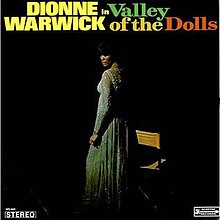
Marie Dionne Warwick is an American singer, actress, and television host. During her career, Warwick has won many awards, including six Grammy Awards. She has been inducted into the Hollywood Walk of Fame, the Grammy Hall of Fame, the National Rhythm & Blues Hall of Fame, the Rock and Roll Hall of Fame and the Apollo Theater Walk of Fame. In 2019, Warwick won the Grammy Lifetime Achievement Award. Three of her songs have been inducted into the Grammy Hall of Fame.

"I Say a Little Prayer" is a song written by Burt Bacharach and Hal David for Dionne Warwick, originally peaking at number four on the U.S. Billboard Hot 100 pop singles chart in December 1967. On the R&B Singles chart it peaked at number eight. The following year, it was a top ten hit for Aretha Franklin.

The Sensitive Sound of Dionne Warwick is the fourth album by the American singer Dionne Warwick, released on February 15, 1965 by the Scepter label. It was produced by Burt Bacharach and Hal David, with Bacharach also arranging the songs.

"Do You Know the Way to San Jose" is a 1968 popular song written and composed for singer Dionne Warwick by Burt Bacharach. Hal David wrote the lyrics. The song was Warwick's biggest international hit to that point, selling several million copies worldwide and winning Warwick her first Grammy Award. David's lyrics tell the story of a native of San Jose, California, who, having failed to break into the entertainment field in Los Angeles, is set to return to her hometown.
"Make It Easy on Yourself" is a popular song written by Burt Bacharach and Hal David which was initially a hit for Jerry Butler in 1962. The best-known version is the 1965 recording by the Walker Brothers, for whom it was a No. 1 UK and Canadian hit. Dionne Warwick, who made a demo of the song in early 1962, later had a hit with it in 1970.

"This Guy's in Love with You" is a hit song written by Burt Bacharach and Hal David and released by Herb Alpert in May, 1968. Although known primarily for his trumpet playing as the leader of the Tijuana Brass, Alpert sang lead vocals on this solo recording, which was arranged by Bacharach. An earlier recording of the song by British singer Danny Williams with different lyrics titled "That Guy's in Love" appeared on Williams' 1968 self-titled album.
"Wishin' and Hopin'" is a song, written by Hal David and Burt Bacharach, which was a US Top 10 hit for Dusty Springfield in 1964.

Make Way for Dionne Warwick is the third studio album by American singer Dionne Warwick. It was released by Scepter Records on August 31, 1964 in the United States. Propelled by the hit singles "Walk on By," "You'll Never Get to Heaven," and "Wishin' and Hopin'", it became Warwick's first album to enter the US charts, reaching the top ten of Top R&B/Hip-Hop Albums.

Here I Am is the fifth album by American singer Dionne Warwick, released on December 21, 1965 by Scepter Records. The LP was produced by Burt Bacharach and Hal David. This album, as was usually the case until 1968, was recorded at Bell Sound Studios in New York City.
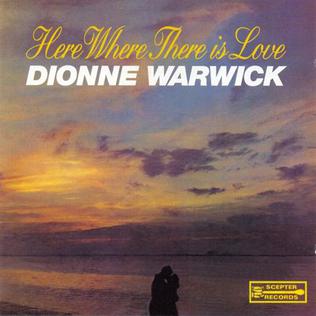
Here Where There Is Love is Dionne Warwick's sixth studio album for Scepter Records, and was released on December 4, 1966. The album was recorded at Bell Sound Studios in New York City and was produced in full by Burt Bacharach and Hal David with Bacharach also arranging and conducting.
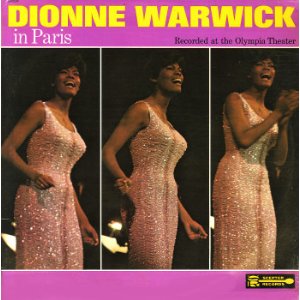
Dionne Warwick in Paris is Dionne Warwick's sixth album, and was released on April 14, 1966 on Scepter Records. It was recorded during Warwick's five-week engagement at the Paris Olympia in January 1966 and was released shortly after the tour was completed. The LP was issued as number 534 in the Scepter Catalog. The liner of this LP is pink with three pictures of Warwick side-by-side, not unlike the Make Way for Dionne Warwick album two years earlier.

On Stage and in the Movies is Dionne Warwick's seventh album for Scepter Records, and was recorded and released in May 1967. The LP was issued as number 559 in the Scepter Catalog.
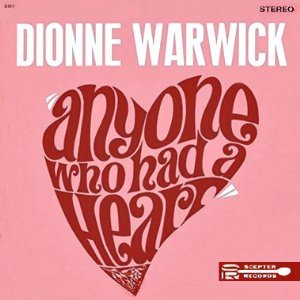
Anyone Who Had a Heart is the second album by the American singer Dionne Warwick, released in 1964 on the Scepter label. It was produced by Burt Bacharach and Hal David.
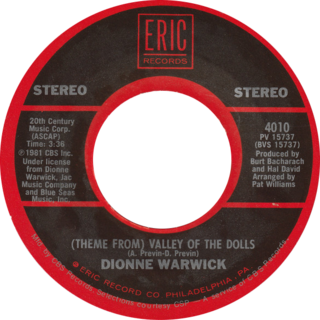
"(Theme from) Valley of the Dolls" is a 1967 song by André and Dory Previn, composed for the film version of the Jacqueline Susann novel Valley of the Dolls, and recorded by Dionne Warwick.

"Message to Michael" is a song written by Burt Bacharach and Hal David, that has been a hit for several different artists under several different titles. The song was first recorded as "Message to Martha" by Jerry Butler in 1962. In 1964, singer Lou Johnson had a minor US hit with the song, with the title "Kentucky Bluebird". British singer Adam Faith also recorded the song as "A Message to Martha " in 1965, and had a substantial hit with it in the UK, reaching No. 12. Exactly the same recording was issued in Australia as "Message to Martha", where it was a No. 15 hit for Faith. In the United States, Dionne Warwick's version, titled "Message to Michael", was a top ten hit there in 1966.

The Windows of the World is the title of the eighth studio album by Dionne Warwick, released on August 31, 1967 by Scepter Records. The LP features the title cut was in the Top 40.
"The Windows of the World" is a song written by Burt Bacharach (music) and Hal David (lyrics) which was a hit single for Dionne Warwick in 1967.

Promises, Promises is the title of a 1968 album by Dionne Warwick, and her eleventh studio album. Like many of her previous albums, it was produced by the songwriting team of Burt Bacharach and Hal David. The album includes three songs from the musical Promises, Promises, for which Bacharach and David wrote the music and lyrics, and which would premiere a month after the album was released: the title song, "Whoever You Are " and "Wanting Things". The album also includes two other Bacharach/David compositions, "This Girl's in Love with You" and "Who Is Gonna Love Me".

"You'll Never Get to Heaven (If You Break My Heart)" is a song composed by Burt Bacharach, with lyrics by Hal David. It was originally recorded by Dionne Warwick in 1964, who charted at number 34 in the US Billboard Hot 100 with her version. It was covered by the Stylistics in 1973, who reached number 23 in the US with their cover.

Dionne Warwick's Golden Hits, Part One is a compilation album by American singer Dionne Warwick, released in 1967 by Scepter Records. The album contains twelve major hits of the singer, recorded from 1962 to 1964. All songs were written and produced by Burt Bacharach and Hal David.
